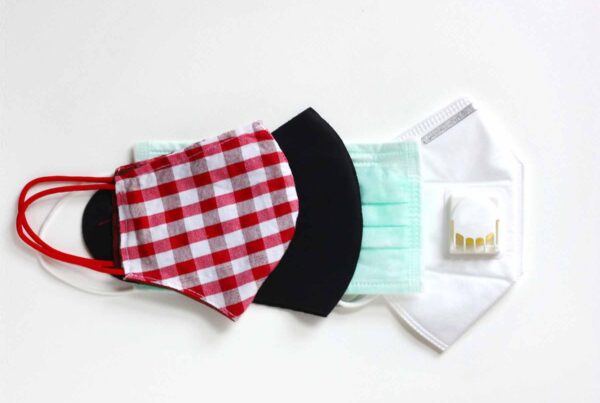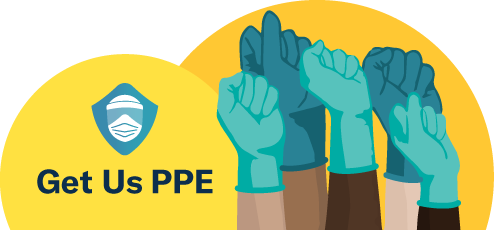N95 masks continue to be in short supply for hospitals and other healthcare professionals despite an excess supply. Meanwhile, PPE sold on WhatsApp, a popular messaging app, has allowed sellers to gouge prices despite a federal crackdown on the practice.
The Big Picture
An update on the number of cases and deaths from the coronavirus: As of Monday, April 5th, the United States has over 30 million cases and 554,000 deaths. As seen over the past few weeks, North Dakota, South Dakota, and Rhode Island have the highest case rates (cases per 100,000 people); California, Texas, and Florida have the highest number of cases. As of this weekend, over 61 million Americans had been vaccinated. New Mexico, South Dakota, and Alaska are leading the vaccination race, having vaccinated the largest percentage of their population compared to other states.
Shopping for PPE on WhatsApp
While most large hospitals are getting their personal protective equipment (PPE) from verified suppliers, the pandemic ushered in a new way to buy and sell PPE. WhatsApp, the messaging app, became the center of the rise in new PPE suppliers. Hundreds of group chats on WhatsApp, named “Corona Supplies 4,” “Virus Group deals 1,” and more, exist to provide small quantities of PPE. The way it works is that suppliers post a new shipment of masks, say, for example, 200 N95 masks just became available, and post an offer to the group. Someone else in the group who knows of a PPE need, at a local hospital, for example, buys the masks and resells them to the hospital. Both the seller and middleman make a profit.
According to those involved, these chats are always booming, sales are always up, and there is never a shortage of money to be made. The success of these markets was largely due to the collapse of the traditional PPE supply chain. Many of these middlemen in WhatsApp groups sell to small facilities or individuals. Dr. Shikha Gupta, executive director of Get Us PPE, explains this as an equity issue. “Well-funded facilities are not having to turn to alternative networks to find PPE…homeless shelters, nursing homes, dentists, and group homes” are the ones struggling to find suppliers.
The legality of these chats has been called into question by many. Price gouging laws are in place to prevent brokers from inflating prices too much; however, criminal defense lawyer Marissa Koblitz Kingman explained that the rules and regulations are murky and confusing. “I had a guy who sold hand sanitizer at a garage sale, and [the AG] is going after him,” she explained when stressing the chaotic nature of price gouging enforcement.
Regardless of its legality, it’s clear that these sellers with no altruistic intent took advantage of the PPE supply shortage and filled the demand. Many brokers entered this market to profit, willing to take the risk that what they were doing was highly discouraged by the federal government.
N95 Masks: Supply-Demand Disconnect, Not Supply Shortage
Esmé Trahair is the project manager for a homeless shelter in Washington, D.C, and her job is to coordinate the delivery of PPE to their shelter. She described the past few months in her job as simply chasing down PPE- whether it be masks, gloves, or COVID-19 tests. Her experience and frustration are in line with recent data from Get Us PPE. With over 86% of PPE requests coming from non-hospital facilities in February and a large portion from nonprofit organizations, it isn’t a surprise that Trahair struggled to obtain the necessary protective equipment for her organization.
But as we have seen before, the problem wasn’t that the PPE wasn’t available; instead, Trahair didn’t have the right connections to obtain it. The PPE crisis has evolved since its beginning. While we initially saw a shortage of gowns, respirators, masks, etc., supply has since caught up. Now the problem lies in connecting donors to requesting facilities. “The pandemic marketplace has been almost impossible to navigate for those little tiny clinics and others that don’t have existing connections,” said Dr. Ali Raja, a co-founder of Get Us PPE. While the CDC has created a list of approved suppliers on their website, this list doesn’t provide needed details about them, such as their pricing and if they take bulk orders.
Organizations like Project N95 have created clearinghouses to connect supply and demand, but many advocate for the government to take over this responsibility. While sources have stated that the Biden Administration is working to resolve this disconnect, they are not actively trying to implement a federal clearinghouse.
This Week at Get Us PPE
Get Us PPE was cited in The Sacramento Bee as a source which indicates the PPE shortage may be easing. Get Us PPE requests dropped 52% in February. The article further explains that new California laws are requiring hospitals to stockpile PPE. Similar laws have been implemented and discussed throughout the country to stop this pandemic and ensure hospitals are more prepared for any future emergency.
Business Insider referenced NPR’s interview with Dr. Gupta, in which she further explained that while PPE shortages are not as widespread as last year, the crisis isn’t over. Nurses are still reusing masks and still have the highest death toll due to COVID-19 among healthcare workers.
In the interview featured on NPR’s Morning Edition, she gave two reasons for the N95 masks supply-demand disconnect: dwindling budgets and mistrust in the market. She explained that “It’s really the small facilities or the mid-sized facilities that are most struggling with trying to find funding,” with many of these facilities wiping out their PPE budgets in the early days of the pandemic. With the stories of price gouging and counterfeit PPE, Dr. Gupta adds, many facilities are “really hesitant about who to trust and who not to.”





